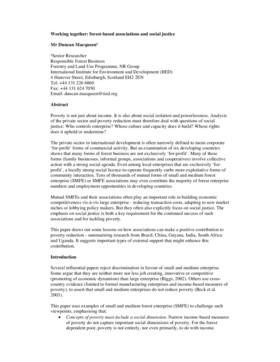Working together: forest-based associations and social justice

Poverty is not just about income. It is also about social isolation and powerlessness. Analysis of the private sector and poverty reduction must therefore deal with questions of social
justice: Who controls enterprise? Whose culture and capacity does it build? Whose rights does it uphold or undermine?
The private sector in international development is often narrowly defined to mean corporate ‘for-profit’ forms of commercial activity. But an examination of six developing countries
shows that many forms of forest business are not exclusively ‘for-profit’. Many of these forms (family businesses, informal groups, associations and cooperatives) involve collective action with a strong social agenda. Even among local enterprises that are exclusively ‘forprofit’, a locally strong social licence-to-operate frequently curbs more exploitative forms of community interaction. Tens of thousands of mutual forms of small and medium forest enterprise (SMFE) or SMFE associations may even constitute the majority of forest enterprise numbers and employment opportunities in developing countries.
Mutual SMFEs and their associations often play an important role in building economic competitiveness vis-à-vis large enterprise - reducing transaction costs, adapting to new market niches or lobbying policy makers. But they often also explicitly focus on social justice. The emphasis on social justice is both a key requirement for the continued success of such associations and for tackling poverty.
This paper draws out some lessons on how associations can make a positive contribution to poverty reduction - summarising research from Brazil, China, Guyana, India, South Africa and Uganda. It suggests important types of external support that might enhance this contribution.
Cite this publication
Available at https://www.iied.org/g00405